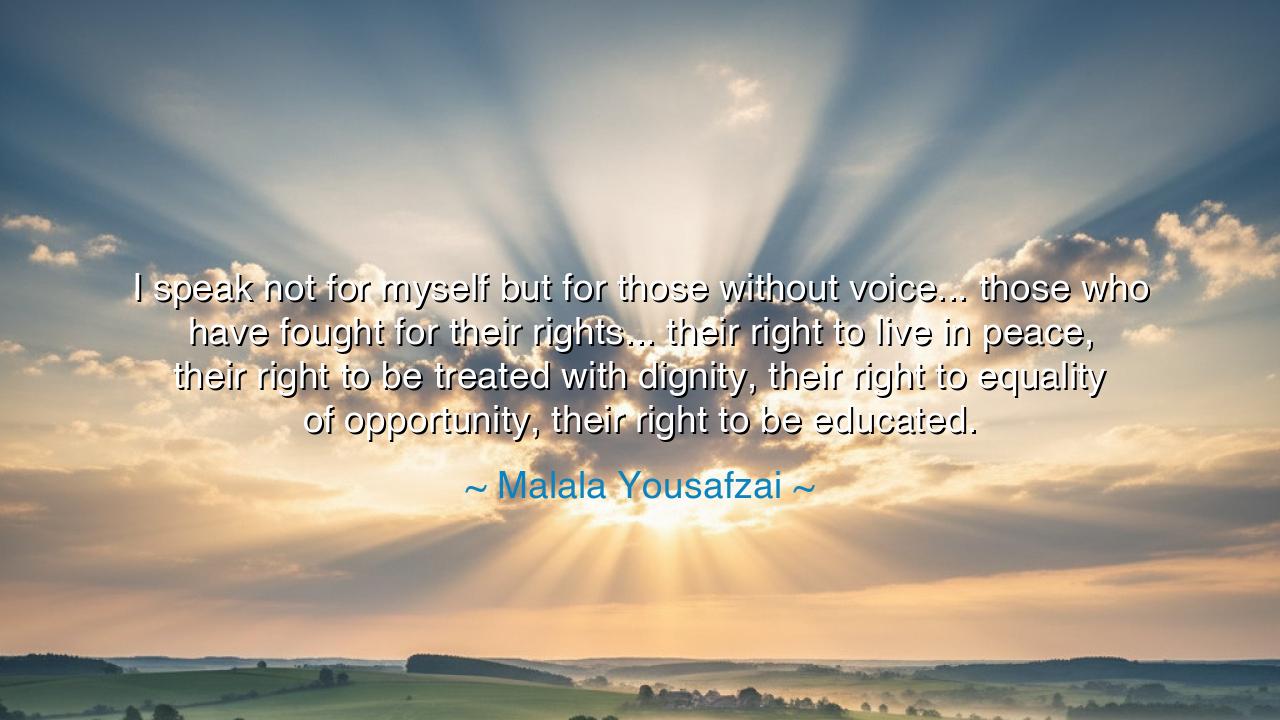
I speak not for myself but for those without voice... those who
I speak not for myself but for those without voice... those who have fought for their rights... their right to live in peace, their right to be treated with dignity, their right to equality of opportunity, their right to be educated.






“I speak not for myself but for those without voice… those who have fought for their rights… their right to live in peace, their right to be treated with dignity, their right to equality of opportunity, their right to be educated.” Thus proclaimed Malala Yousafzai, a child of courage and a herald of freedom, whose voice rose like dawn over a world shrouded in silence. In these words she captures the essence of selfless purpose—the sacred act of speaking, not for glory, but for justice; not for oneself, but for those silenced by fear, oppression, and neglect. Her voice, once a whisper in the mountains of Pakistan, became a trumpet that called nations to remembrance: that to be human is to recognize the divine worth in every other soul.
The origin of this quote lies in the crucible of suffering and defiance. Malala was born in the Swat Valley, a place of beauty turned to shadow when tyranny rose against learning. The enemies of light sought to extinguish knowledge by denying it to girls, believing that an uneducated mind is an obedient one. Yet from among the oppressed stood this young girl, slight of stature but mighty in spirit, who dared to say that education is not a privilege, but a right, not a gift to be given by the powerful, but a treasure already belonging to every child. When she was struck down for her courage, the bullet meant to silence her became a beacon that awakened the conscience of the world.
In her words, “I speak not for myself,” there resounds the eternal echo of all who have borne witness for the voiceless. Her statement transcends her own story—it belongs to the lineage of prophets, reformers, and martyrs who have carried the burden of humanity upon their tongues. Like Moses standing before Pharaoh, like Joan of Arc before her judges, like Martin Luther King Jr. in the face of hatred, Malala became not merely a person, but a symbol of the universal struggle for dignity, equality, and peace. She reminds us that the true leader is not the one who speaks loudest, but the one who speaks for those who cannot speak at all.
The power of her words lies in their simplicity. She does not demand riches, vengeance, or power. She asks only for what should never have been withheld: peace, dignity, equality, and education. These are not luxuries—they are the pillars of civilization. For when a child is denied the right to learn, an entire generation is robbed of its future. When a person is stripped of dignity, the whole human family is diminished. Malala’s cry is thus not a plea for women alone, nor for her nation alone—it is a call for all humanity to remember its sacred promise: that no life is lesser, no dream unworthy, and no voice too small to matter.
Consider, for a moment, the story of another who spoke for the silent—Nelson Mandela, who endured twenty-seven years of imprisonment to proclaim that freedom belongs to all races and all people. Like Malala, Mandela emerged not with bitterness, but with a vision of reconciliation. He, too, spoke not for himself, but for his people—for their right to live in peace, to walk with dignity, to labor and to learn as equals. In every age, the torch of justice is passed from one soul to another, and through Malala, it shines again, illuminating the path for those yet to be born.
But her quote carries also a warning—that silence is complicity. She teaches that to be human is to speak, to act, to defend the helpless. The privilege of a voice is also a duty. Each of us, in our own way, must rise to be a Malala for someone—for the abused child, the persecuted minority, the forgotten poor. The measure of our compassion is not in words but in courage—the courage to lift the weak, to challenge injustice, and to risk comfort for truth. For as long as there are those without voice, the world remains incomplete, and every silence becomes a wound upon the soul of mankind.
So, my listener, hear the wisdom that flows through Malala Yousafzai’s words as through an ancient river: to speak for others is to awaken the divine within oneself. Do not wait for permission to do what is right. Speak where others are silent; defend where others turn away. Education, dignity, and peace are not gifts bestowed by the powerful—they are birthrights entrusted to all. When you use your voice for those who have none, you become part of the eternal chorus of justice that echoes through the ages.
And thus, Malala’s words endure—not as the cry of a single girl, but as the song of a world striving toward its better self. Her voice reminds us that freedom is not secured by silence but by speech, not by fear but by faith, not by division but by compassion. Let her message be carved upon the hearts of the living: that every human being, regardless of place or gender or circumstance, carries within them the right to learn, to dream, and to live in peace. And when we defend that right for others, we defend it for all.






AAdministratorAdministrator
Welcome, honored guests. Please leave a comment, we will respond soon